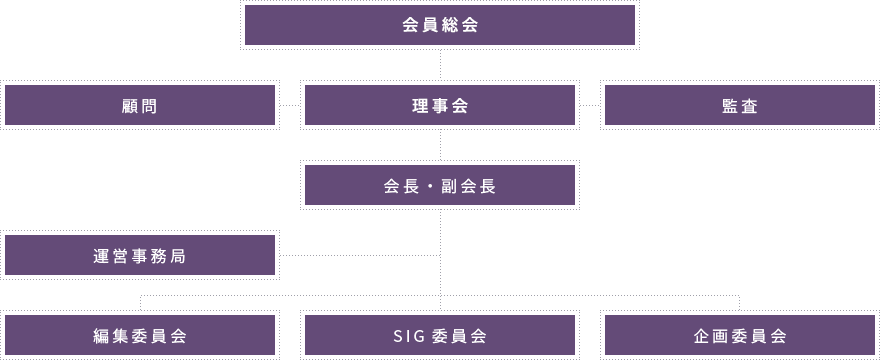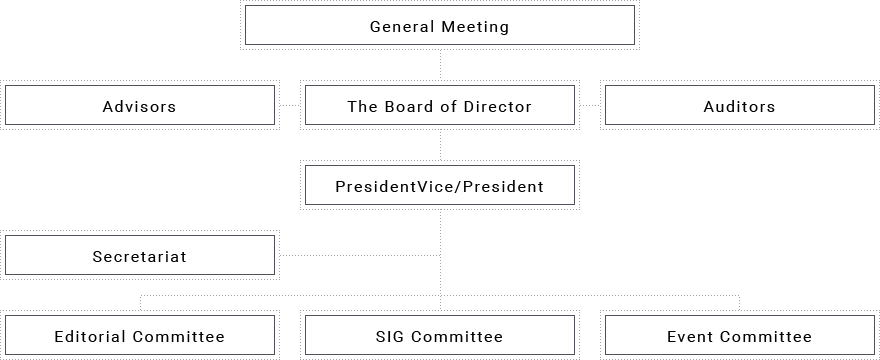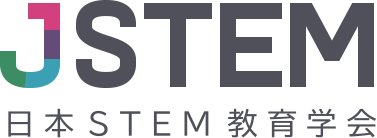Click here for English version
組織図

理事
- 職務
- 氏名
- 所属
-
代表理事・会長
新井 健一
日本STEM教育学会 会長
-
理事・副会長
白水 始
国立教育政策研究所 総括研究官
-
理事・副会長
中川 一史
放送大学 教授
-
理事
石戸 奈々子
特定非営利活動法人 CANVAS 理事長
-
理事
大谷 忠
東京学芸大学大学院
-
理事
熊野 善介
静岡大学 名誉教授
-
理事
小村 俊平
岡山大学 学長特別補佐
-
理事
佐藤 幸江
放送大学 客員教授
-
理事
谷内 正裕
日本STEM教育学会 事務局長
-
理事・顧問
赤堀 侃司
一般社団法人 ICT CONNECT21 会長
-
理事・顧問
安西 祐一郎
日本学術振興会 学術情報分析センター 所長
(50音順)
監事
- 役職
- 氏名
- 所属
-
監事
住谷 徹
日本STEM教育学会
編集委員会
- 職務
- 氏名
- 所属
-
編集長
赤堀 侃司
一般社団法人 ICT CONNECT21
-
副編集長
中川 一史
放送大学
-
編集委員
大谷 忠
東京学芸大学大学院
-
編集委員
岡部 恭幸
神戸大学大学院
-
編集委員
加藤 由樹
相模女子大学
-
編集委員
鹿野 利春
京都精華大学
-
編集委員
齊藤 萌木
聖心女子大学
-
編集委員
下郡 啓夫
函館工業高等専門学校
-
編集委員
鶴田 利郎
国際医療福祉大学
-
編集委員
堀田 博史
園田学園女子大学
-
編集委員
益川 弘如
青山学院大学
(50音順)
研究会・SIG活動
日本STEM教育学会では,研究会・SIG (Special Interest Group、研究分科会)を設置し、本学会における特定の重要なテーマについて研究を進めていきます。
各研究会・SIGへの参加をご希望の会員は、下記連絡先までご相談ください。
1. これからのSTEM教育を考える研究会
- 2. プログラミング教育/6-18のプログラミング教育研究会
-
研究テーマ:
小学校では、コンピュータに意図した処理を行わせるための論理的な思考力「プログラミング的思考」などを育むこと、中学校においてはプログラミングに関する内容を充実すると共に、高等学校では必履修科目「情報Ⅰ」を新設し、すべての生徒がプログラミングのほか、ネットワークやデータベースの基礎などについて学習することとなっていることを踏まえ、小・中・高を通じて、プログラミング教育を捉え直すことを目指して、以下の研究テーマに取り組みます。- 6歳から18歳のプログラミング教育 ・小→中→高等学校の接続における中で、育成される資質・能力の検討
- プログラミング教育に関する、その他研究 ・日本独自のプログラミング教育の在り方の検討
・問題解決法としてプログラミング教育の在り方の検討
・授業デザインやカリキュラム・マネジメントの在り方の検討
連絡先:[email protected]
- 3. 学びのオープン・イノべーション研究会
-
研究テーマ:
博物館、科学館などを拠点としたオープンイノベーションを目指して、以下の研究テーマに取り組みます- 子どもや教育関係者を対象としたワークショップを通じた開発・検証
- ワークショップを通じ、アイデアを形にするイノベーション拠点の形成
- 学びの可視化や、ファシリテーション支援、効果検証方法の開発
- その他、テクノロジーと学びに関する研究
連絡先:[email protected]
- 4. STEAM教育研究会
-
研究テーマ:
今、なぜSTEAM教育なのか。そしてAの意味とは、人間とは。
それらの探究の先に、日本独自のSTEAM教育の在り方を目指して、以下の研究テーマに取り組みます
- 芸術の可能性の探究 ・多重知能理論など、芸術の教育効果の基盤となる理論の研究
- STEAM教育の基盤としての人間教育について ・Society5.0の実現のために求められるメタ認知、批判的思考力、創造性などの資質・能力の検討
- デザインとSTEAM教育の関係 ・エンジニアリングデザイン能力の育成、PBLの教育方法などの探究
- 上記を踏まえた、日本独自のSTEAM教育の在り方の検討
・芸術の教育効果測定の方法論の検討
・アートインテグレーション、バイオアートなど、アートを使ったSTEAMの学びの可能性の探究
・ジャポニズムなど、日本の芸術の捉え直し
・アートセラピーなど、芸術の応用可能性の探究 など
・STEAM教育の基盤としてのリベラルアーツの在り方の検討
・well-beingの探究とその実現の具体的方法の検討 など
・問題解決方法としてのデザインの在り方の探究 など
連絡先:[email protected]
- 5. Maker教育研究会
-
研究テーマ:
Maker教育SIGでは、学校教育・部活動・課外活動の中でのMaker教育の実践者、研究者の方を対象とし、以下を軸に活動を行います
- Maker教育の価値や育成したい力の検討・公開 児童・生徒たちが今後どのような社会で生きていくのかをもとに、Maker教育の価値やつけたい力など、Maker教育の価値を検討し、JSTEM学会を通じて発信します。
- 実践事例をもとにしたMaker教育の育成方法の検討・公開 1での検討をもとに、Makerに必要な資質・能力を育成するための観点と、学習活動の中での児童・生徒へのフィードバック方法について検討を行い、成果物をJSTEM学会を通じて発信します。
連絡先:[email protected]
賛助会員
日本STEM教育学会では、趣旨にご賛同いただき本学会の維持にご協力いただける法人および団体を募集しています。
- 株式会社GRIPS
https://grips.co.jp/
Organization Structure

Directors
- Role
- Name
- Affiliation
-
President
Kenichi Arai
President, Japan Society for STEM Education
-
Vice President
Hitoshi Nakagawa
Professor, The Open University of Japan
-
Vice President
Hajime Shirouzu
Professor, The University of Tokyo
-
Director
Nanako Ishido
President, CANVAS
-
Director
Shunpei Komura
Special Adviser to the President, Okayama University
-
Director
Yoshisuke Kumano
Professor, Shizuoka University
-
Director
Masahiro Yachi
Secretary General, Japan Society for STEM Education
-
Advisor
Kanji Akahori
President, ICT CONNECT21
-
Advisor
Yuichiro Anzai
President, Japan Society for the Promotion of Science
(Alphabetical order)
Auditor
- Role
- Name
- Affiliation
-
Auditor
Toru Sumiya
Japan Society for STEM Education
Editorial Committee
- Role
- Name
- Affiliation
-
Editor-in-Chief
Kanji Akahori
ICT CONNECT21
-
Vice Editor-in-Chief
Hitoshi Nakagawa
The Open University of Japan
-
Reviewing Editor
Hiroshi Hotta
Sonoda Women's University
-
Reviewing Editor
Toshiharu Kano
Kyoto Seika University
-
Reviewing Editor
Yuki Kato
Sagami Women's University
-
Reviewing Editor
Hiroyuki Masukawa
Aoyama Gakuin University
-
Reviewing Editor
Tadashi Ohtani
Tokyo Gakugei University
-
Reviewing Editor
Yasuyuki Okabe
Kobe University
-
Reviewing Editor
Moegi Saito
University of the Sacred Heart
-
Reviewing Editor
Akio Shimogori
National Institute of Technology, Hakodate College
-
Reviewing Editor
Toshiro Tsuruta
International University of Health and Welfare
(Alphabetical order)
SIG (Special Interest Group) Activities
JSTEM organizes SIG (Special Interest Group) to pursue research on certain important themes of STEM education.
To participate in each SIG, please contact the following representative.
1. Future Vision of STEM Education
- 2. Programming Education/Programming Education from age 6 to 18
-
Research Theme:
"Programming thinking" is introduced in Japanese elementary school curriculum to develop logical thinking required to make computers execute the intended commands. Further extensive contents are included at junior high schools and at senior high schools a new subject “Information I” is mandatory for all the students to learn about the basic network and database as well as programming. Considering this situation our group works on the following themes to review the overall programming education from elementary schools to senior high schools.- Programming education from age 6 to 18 ・Review of competencies to be developed in the course of education from elementary schools to senior high schools
- Other researches on programming education ・Review of programming education model unique to Japan
・Review of programming education as a means of problem-solving
・Review of class design and curriculum management methods
Contact: [email protected]
- 3. Open Innovation of Learning
-
Research Theme:
- Design and evaluation of workshop-style learning activities for children and educators.
- Design an open innovation platform for idea realization through workshop activities.
- Research on learning data visualization, facilitation support guides, and evaluation methods.
- Other projects related to technology and learning.
Contact: [email protected]
- 4. STEAM Education
-
Research Theme:
Why STEAM education now? What does A mean? What is human being?
Through the quests for those we will deal with the following themes to seek the STEAM education model unique to Japan
- In-depth studies on the potential of art ・Studies on the theories such as multiple intelligence theory underlying the effect of art on education
- Human education as the basis of STEAM education ・Review of competencies such as metacognition, critical thinking and creativity required for the realization of Society 5.0.
- Relationship between design and STEAM education ・Studies on engineering design skills promotion and PBL teaching methods
- Review of STEAM education model specific to Japan considering above matters
・Review of methods to measure educational effects of art
・Studies on potential of STEAM education with Arts Integration and BioArt, etc.
・Reexamination of Japanese art such as Japonisme
・Studies on potential in introducing art such as art therapy
・Review of liberal arts as the basis of STEAM education
・Exploration of well-being and review of practical ways for realization
・Studies on role of design as a means of problem-solving, etc.
Contact: [email protected]
- 5. Maker Education
-
Research Theme:
Maker Education SIG focuses on the following themes working with researchers of Maker education as well as instructors of Maker education in the classrooms, club activities and extracurricular activities.
- Review and presentation of the value of Maker education and skills to be developed
Our group examines the value of Maker education and skills we aim to grow envisaging what kind of society children will live in the future. We also present our findings through JSTEM. - Review and presentation of Maker education methods based on the practical cases
Based on the discussion at 1, our group considers from which perspectives we should develop competencies required for Maker and we also examine feedback methods in learning activities. Our research will be published through JSTEM.
Contact: [email protected] - Review and presentation of the value of Maker education and skills to be developed
